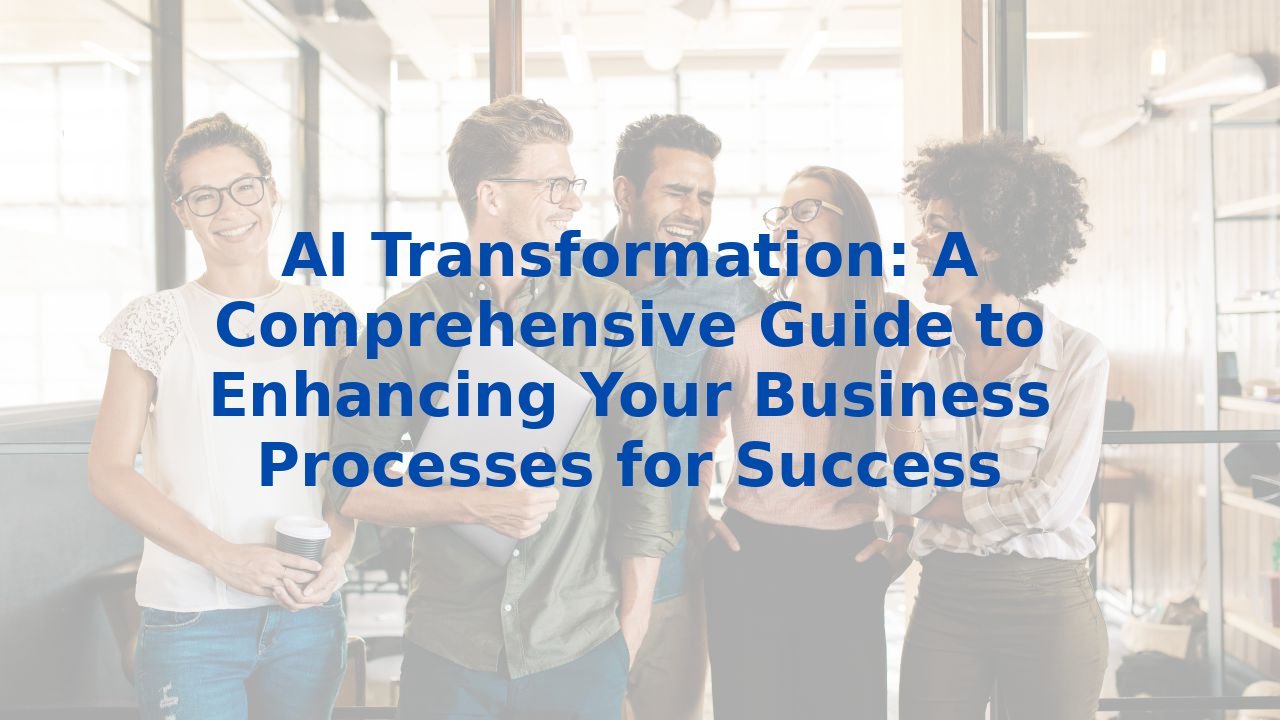AI Transformation: A Comprehensive Guide to Enhancing Your Business Processes for Success
AI Transformation: A Comprehensive Guide to Enhancing Your Business Processes for Success
In an age where change is the only constant, organizations are on an unyielding quest for innovation and efficiency. Enter Artificial Intelligence (AI) — a game changer for business processes. Today, more than ever, understanding the intersection of AI with core business operations is imperative for those eager to thrive in a competitive landscape. Let's delve into how AI can robustly enhance various business processes, leading to greater efficiency and effectiveness.
1. Improving Meetings
Meetings are often seen as a necessary evil. They can be time-consuming and may lack focus. Thankfully, AI has stepped in to streamline these essential gatherings. Automated systems can handle scheduling appointments, offering solutions for managing availability across teams. Tools that summarize key takeaways or transcribe discussions save valuable time, allowing participants to focus on strategy rather than logistics.
Imagine walking away from a meeting with all the vital discussions documented without lifting a pen — that’s efficiency redefined!
2. Enhancing Sales and Marketing
Sales and marketing strategies benefit immensely from AI's analytical prowess. AI-driven insights can predict customer behaviors, inform lead scoring, and even identify potential churn risks. This foresight permits sales teams to prioritize high-value clients, leading to improved revenue outcomes. Furthermore, integrating AI chatbots into marketing channels enhances customer engagement. By addressing common queries instantly, businesses can enhance the customer experience, reducing the risk of potential leads slipping away.
3. Assessing and Improving Customer Service
Exceptional customer service is vital in today’s marketplace. AI algorithms can assess interactions and provide an objective analysis of service quality. By monitoring calls and chats, AI can identify patterns of unsatisfactory experiences. Not only does this improve overall satisfaction, but it also equips managers with actionable insights for training and development, ensuring every customer interaction builds loyalty and trust.
4. Improving Product Development Processes
The innovation cycle can be lengthy and resource-intensive. AI has the potential to transform product development through generative design. This process enables designers to set parameters while AI explores countless design options. By leveraging data, organizations can avoid the inefficiencies of traditional prototyping, leading to faster time-to-market without sacrificing creativity or quality.
5. Automating Content Generation
Content is everywhere, and its demand continues to surge. Fortunately, AI empowers organizations to generate quality content at scale. From automated reports to promotional materials, AI can craft numerous pieces in mere moments. This liberation of creative talent allows human writers to channel their energy toward strategy, deepening brand narratives rather than getting bogged down in the minutiae of content creation.
The Role of AI in Business Process Management
Business Process Management (BPM) is where AI shines, offering significant enhancements across various facets:
1. Process Discovery
Through techniques like process mining and natural language processing, AI can unveil inefficiencies lurking in business operations. By using vast amounts of operational data, AI helpfully spot bottlenecks often unnoticed, driving organizations toward swift resolution.
2. Process Automation
With AI at the helm, routine tasks such as data entry and document processing can be automated, slicing through the noise of manual tasks. This not only reduces human error but amplifies overall productivity.
3. Process Management
Dynamic monitoring of processes ensures that organizations stay proactive rather than reactive. AI continuously analyzes data and can alert management to potential issues before they escalate, transforming the approach from crisis-management to strategic oversight.
4. Process Improvement
AI’s commitment to continuous analysis allows organizations to evolve their BPM strategies iteratively. By providing data-driven insights and predictive modeling, AI drives a culture of sustained improvement, balancing innovation with operational excellence.
Benefits of Training Employees for AI
While AI can automate a plethora of tasks, the importance of trained employees cannot be overstated. Here’s why investing in employee training for AI is essential:
- Enhanced Collaboration: With a deep understanding of AI, employees can effectively collaborate, ensuring that AI-generated insights are applied meaningfully.
- Improved Decision-Making: Knowledgeable employees can interpret AI data accurately, leading to actionable strategies that align with business objectives.
- Increased Efficiency: Training in AI tools enhances productivity, allowing teams to optimize their time and reduce error margins.
- Adaptability: An AI-educated workforce can pivot with ease as technology advances, ensuring organizational agility.
Conclusion
AI is not merely a buzzword; it's the backbone of the next wave of business transformation. By enhancing meetings, sales and marketing, customer service, product development, and overall BPM, AI places organizations on the fast track to success. Moreover, investing in employee training elevates these benefits, reinforcing a culture of innovation. Embrace this transformative journey, for those who adapt and evolve will inevitably lead the market into the future.



